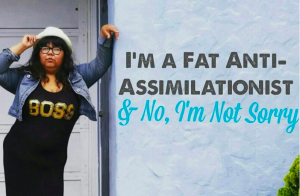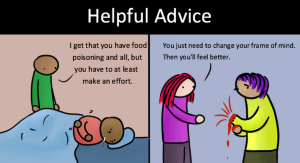
Source: Cysfresno
Originally written through the Rad Dad Magazine Collective and cross-posted here with their permission.
In the wake of the Santa Barbara mass shooting and the misogynistic and racist manifesto that the killer left behind, women all over the world launched a Twitter-based rebellion that put misogyny and sexism front and center.
Far too many men have responded with cries “not all men act that way,” using the hashtag #notallmen. At best, that such a defense is even needed proves that there is a very real, unavoidable problem; at worst, it sounds as though they are saying “Don’t blame me.”
Rad Dad Magazine believes that patriarchal violence in society is epidemic and takes place in a vast culture of misogyny, male entitlement, and male privilege. Against the reactionary cry of “not all men,” we say, “all men need to actively challenge misogyny and cultivate feminism in their lives, families, communities, and society.”
Rad Dad Magazine recognizes that fighting patriarchy requires more than believing that, individually, we are not like “those other men” — because privilege doesn’t work that way. We can’t be silent about it or pretend we don’t have it.
In the pages of Rad Dad, we embrace feminist struggle against patriarchy as key to creating healthy families. We offer stories of people struggling to be better men, to be better community members, to be better people.
We believe that the key lies in changing masculinity – to raise boys to feel cared for, to be aware of their own feelings, to see women as people like themselves and not objects, to hold men accountable for their behavior and reward them for demonstrating compassion and empathy.
In addition to including our sons when imagining and practicing feminist parenting, we also know that in order to end misogyny and patriarchal violence, men in the millions need to make feminism central in our lives.
How can we make feminist commitments this Father’s Day?
Let us join together and make this Father’s Day a Feminist Father’s Day. Let us be bold and courageous, knowing that we can make a huge difference in the lives of our children, families and communities. Let us join with feminist movements to help change society, one diaper, load of dishes, conversation, public stand, direct action, mass convergence, at a time.
We know that subscribing to a magazine or reading a book is a poor substitute for action. So for Father’s Day we encourage you to post a picture or video of you and your child illustrating what rad parenting means to you.
Tag it #feministfathersday. Then join us in making a commitment to take at least one action against patriarchy and misogyny in real life.
If you need ideas, the list below includes actions that some of us are already taking, just getting started with, or finding the strength to take on in the future, ranging from the civic to the personal, the playful to the political but each one is geared so that feminism is at the heart of our families.
1. Believe in other men’s ability to parent. Talk to other men about fathering.
2. Strive to do more than half of the labor of raising a kid, building a family, and maintaining a home. This is part of living our feminist values in our family and being a good role model for our kids and their friends.
3. Do your kid’s hair, cook, clean, and/or other responsibilities that “women” usually do that are also intimate bonding experiences.
4. Pick flowers for your little boy and fix stuff around the house with your little girl.
5. Play pretend.
6. Listen to when a child says stop. Then stop!
7. Encourage the boys in your life to enter the worlds created by girls during play and encourage them to invite girls into theirs. The invitation is the key. Stop them if they try to impose their worlds.
8. Teach your kids how to do the stuff you know how to do, regardless of gender.
9. Talk with other parents about how they practice feminism in their parenting and families. This is useful both to gather insights and to help normalize the conversation between parents, particularly for dads.
10. Talk with your kids about mainstream beauty standards.
11. Vocalize your support of breastfeeding moms.
12. Read books about feminism – to your kids and to yourself.
13. Say, “Everyone gets to choose for their own body” often enough that your kids think of it as one of your catch phrases.
14. Use “feminism,” “patriarchy,” “misogyny,” “sexism” and related words in your everyday conversations with kids and take time to listen to their use of those words. They have brilliant insights about the oppression they see.
15. Talk to your kids about how women used to be treated when talking about history (and how a lot of change is still needed).
16. Commit to eliminating violence, aggression, and force with women and children.
17. Teach your kids about mansplaining and male entitlement and why it hurts all of us.
18. Teach them about male privilege at an early age. Teach them to use their privilege in the service of others until the time they are ready to attempt to eradicate it.
19. Let your kids hear you defend your feminism. At first you might feel like your talk about feminism is forced and mechanical, like swimming against the current. In time, we will find our own voices, develop our confidence, and speak from our hearts in ways that are both healing and empowering to ourselves and our families.
20. Once a day or once a week, talk about an example you saw of patriarchy or sexism.
21. Don’t shame kids of any gender for being girly. Feminine gender expression is as valuable and wonderful as any other! Read books like Princess Boy to help normalize and celebrate boys who wear dresses and embrace feminine gender expressions. While “tomboys” are generally accepted, it’s good for all kids to see that boys like girly things, too.
22. Don’t let your kids hear you make generalizations about people based on gender, like “it’s a boy thing” and “it’s a girl thing.” These ideas harm kids of all genders. If and when you do say it, be honest and compassionate with yourself, saying something like, “Why did I say that? Is that actually true? I don’t think so.”
23. Reject the pink/blue color code.
24. Do not assign female traits to inanimate objects. Your car is a car. Do not refer to it as “her” or “she” or any other anthropomorphized designation.
25. Talk about stereotypes with your kids.
26. Combat images of bumbling fathers in the media. Talk to your kids as you encounter these stereotypes. Dadcott Adam Sandler movies!
27. Make a point to ask if there are changing tables in the men’s restrooms everywhere you go.
28. Speak up when you see unwanted tickling.
29. Teach consent every day. Teach your child that we need permission to touch each other’s bodies. Raise our daughters to be safety conscious and to have a healthy self-esteem against the onslaught of sexism and misogyny. Raise our sons to promote consent culture.
30. Make a plan for how you are going to teach your kids about rape. Men, have conversations with other dads about this and ask them what they’re thinking of doing. Be ready to share about why you think it’s so important that we talk with all of our kids about it. Again, our goal is to create a culture of men working together to support each other to end misogyny and generate feminist power.
31. Men: tell your kids when patriarchy hurts you. Be emotionally open about challenges and difficulties, like times when you were told “act like a man, don’t cry” and how that impacted you. Our example of taking emotion risks will speak louder then encouraging our kids to do it.
32. When you do something wrong, let your kids see you own up to it rather than blaming someone else.
33. Don’t argue or get defensive when women talk about their experiences.
34. Listen when women are talking.
35. Teach sons (and daughters, too) to listen and ask questions.
36. Sex-positivity is a family value. When sex comes up, be open, honest, and positive.
37. Work with your child to write a letter to a politician, local newspaper, or blog about an issue that affects women in your community.
38. Figure out how you are going to talk to you kids about abortion and reproductive justice.
39. Explain to your teenager why you are pro-choice.
40. Talk to your kids about how to stand up when they see someone treated badly.
41. Discuss unfair power with your kids.
42. Teach your kids about a feminist activist, famous or not.
43. Learn and teach each your kids about Mujeres Libres, the Combahee River Collective, Riot Grrrls, and other movements for women’s liberation.
44. Don’t be an asshole to women or girls. It is not calculus. Treat women and girls with respect, always, but especially in the presence of young boys. You’ll be all the example the boys in your life need.
45. Teach them that sensitivity, caring, and empathy make you strong.
46. Call out gender/sex-based discrimination in public — if it is safe to do so. If it is not acceptable in the home, it damn well shouldn’t be acceptable in the world.
47. As a family, go to demonstrations and community events that support feminist politics and use the experience to talk with your kids. Think about ways to make it as enjoyable for your kids as possible, whether that’s going with friends, or getting a special treat afterwards that makes it part of a fun family outing.
48. Talk with one or two close friends about ways you can support each other and share in the joys, difficulties, heartbreaks, and beauty of liberation parenting.
49. Strive to be compassionate, forgiving, and reliable in doing this work. Beating yourself up for mistakes and missed opportunities will lead to burnout and self-hatred, neither of which we want for ourselves or to model for our kids. Be the parent to yourself that you are for your kid, believing in yourself, ready to pick yourself back up with a pep talk about what we learned so as to be better prepared next time.
50. Men, be expressive with your love and tenderness. Strive to be emotionally open and fluent in love, appreciation, and gratitude. Patriarchy teaches men to be fiercely competitive with other men and to be oblivious to the contributions of women. Naming and speaking our love, appreciation and gratitude helps counter this.
***
Father’s Day is a national holiday dedicated to celebrating the men in our lives who raised us, who made a difference, who taught us some sense of morality.
Let it, too, then, be a day when we contemplate how better to practice our feminist values in the hopes of evolving fatherhood.
[do_widget id=”text-101″]
Want to discuss this further? Visit our online forum and start a post!
Chris Crass is the father of a beautiful little boy named River, and is a longtime social justice organizer who writes and speaks widely about anti-racist organizing, feminism for men, lessons and strategies to build visionary movements, and leadership for liberation. He is the author of Towards Collective Liberation: Anti-racist Organizing, Feminist Praxis, and Movement Building Strategy, published by PM Press. He is a Unitarian Universalist and lives in Nashville, Tennessee. His website is www.chriscrass.org.
Tomas Moniz is the founder, editor, and writer for the award winning zine, book, and now magazine: Rad Dad. He just released a novella, Bellies and Buffalos, which is a tender, chaotic road trip about friendship, family, and Flamin’ Hot Cheetos. He has helped raise three children and has been making zines since the late nineties. He teaches basic skills classes and creative writing at Berkeley City College. His website is www.raddadmagazine.com.
Search our 3000+ articles!
Read our articles about:
Our online racial justice training
Used by hundreds of universities, non-profits, and businesses.
Click to learn more




















